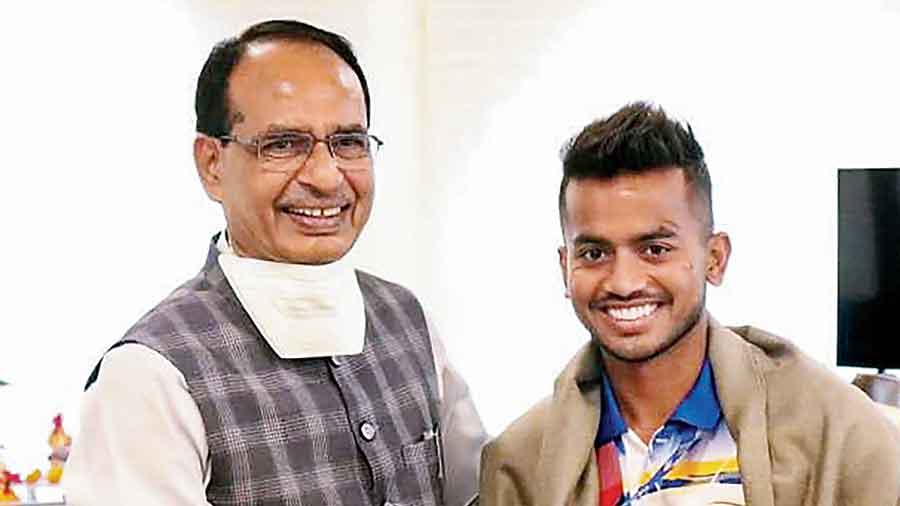Representing your country in the Olympics at 21 is no mean feat. And when you come home with an Olympic medal, the world around you changes.
That is the story of India hockey team’s young midfielder Vivek Sagar.
Accolades, cash rewards, a job with the Madhya Pradesh police — all this has come his way after the India men’s hockey team returned with the bronze medal from the Tokyo Olympics.
But for the youngster from Chandon — a sleepy village near Hoshangabad, a small town in Madhya Pradesh’s Itarsi district — the biggest prize had been the tears of joy that his parents shed once they heard the news.
“After we won the bronze (defeating Germany 5-4 in Tokyo on August 5) I video called my parents. We could hardly talk. I just showed them the medal and we all had tears in our eyes,” Vivek told The Telegraph.
There are reasons for the tears. His father Rohit Sagar Prasad did not really want his son to be a hockey player. “I am the youngest of four children. No one in our family is into sports. My father is a school teacher and he wanted me to study and become an engineer. But today he is very proud of me,” he said.
“I started playing hockey in our village when I was about 10 years old and used to hide any injury I had from my mother. But I gradually got better.” Vivek owes a lot to one of India’s finest hockey players, Ashok Kumar, son of the legendary Dhyan Chand.
In 2013, during a hockey tournament in Akola in Maharashtra, Vivek was spotted by Ashok Kumar. His keen and experienced eye immediately recognised Vivek’s special talent and offered him a place in the MP hockey academy in Bhopal.
“That changed my life. I was stunned when he came up to me. He is such a great player and coach. There was some problem initially and I could not stay at the academy. Ashok Sir, who was the chief coach at the academy then, put me up in his home and used to take me for practice every day,” Vivek said.
There has been no looking back for him since then. “In 2017 I captained the team. In 2018 I made my debut for the senior team,” he said.
Being one of the youngest members of the India team, Vivek counts on his seniors for advice and guidance. “It does get tough during major tournaments like the Olympics this time. But my seniors always guide me.”
Asked how it felt to be part of an Indian contingent which has given India the most number of medals (seven) in Olympics till date, he said: “We were happy that other India players were winning medals. But at the same time it also put pressure on our team, that we also had to do something and prove ourselves.”
Representing your country in the Olympics at 21 is no mean feat. And when you come home with an Olympic medal, the world around you changes.
That is the story of India hockey team’s young midfielder Vivek Sagar.
Accolades, cash rewards, a job with the Madhya Pradesh police — all this has come his way after the India men’s hockey team returned with the bronze medal from the Tokyo Olympics.
But for the youngster from Chandon — a sleepy village near Hoshangabad, a small town in Madhya Pradesh’s Itarsi district — the biggest prize had been the tears of joy that his parents shed once they heard the news.
“After we won the bronze (defeating Germany 5-4 in Tokyo on August 5) I video called my parents. We could hardly talk. I just showed them the medal and we all had tears in our eyes,” Vivek told The Telegraph.
There are reasons for the tears. His father Rohit Sagar Prasad did not really want his son to be a hockey player. “I am the youngest of four children. No one in our family is into sports. My father is a school teacher and he wanted me to study and become an engineer. But today he is very proud of me,” he said.
“I started playing hockey in our village when I was about 10 years old and used to hide any injury I had from my mother. But I gradually got better.” Vivek owes a lot to one of India’s finest hockey players, Ashok Kumar, son of the legendary Dhyan Chand.
In 2013, during a hockey tournament in Akola in Maharashtra, Vivek was spotted by Ashok Kumar. His keen and experienced eye immediately recognised Vivek’s special talent and offered him a place in the MP hockey academy in Bhopal.
“That changed my life. I was stunned when he came up to me. He is such a great player and coach. There was some problem initially and I could not stay at the academy. Ashok Sir, who was the chief coach at the academy then, put me up in his home and used to take me for practice every day,” Vivek said.
There has been no looking back for him since then. “In 2017 I captained the team. In 2018 I made my debut for the senior team,” he said.
Being one of the youngest members of the India team, Vivek counts on his seniors for advice and guidance. “It does get tough during major tournaments like the Olympics this time. But my seniors always guide me.”
Asked how it felt to be part of an Indian contingent which has given India the most number of medals (seven) in Olympics till date, he said: “We were happy that other India players were winning medals. But at the same time it also put pressure on our team, that we also had to do something and prove ourselves.”










